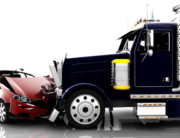Many different factors can cause truck accidents. Some things are sufficient by themselves to lead to a crash, while others combine with other things to result in a collision.
The Federal Motor Carrier Safety Administration (FMCSA) studies crashes of large trucks. They report that these factors are common causes of truck accidents:
- Fatigue on the part of the truck driver or the operator of another motor vehicle can cause a person to pay less attention, fall asleep at the wheel, or have a slower reaction time to road events.
- Drinking alcohol can cause problems similar to fatigue for the driver of a tractor-trailer or another vehicle. Alcohol can cause impaired judgment, cloudy thinking, and slower processing time.
- Speeding is another major factor in causing accidents that involve large trucks. Trucks need more distance to slow down because of their massive size and weight. When you add speeding to the situation, there is even less time to avoid a collision, increasing the odds of a crash.
An Accident Waiting to Happen
Some elements that lead to track crashes take place hours, weeks, or even years before the collision. For example:
- The tractor-trailer driver’s training and experience might be insufficient to handle real-life situations on the road. As a result, the truck driver might engage in driving behavior that causes an accident or lacks the skills to avoid a wreck in which someone else is at fault.
- Problems with the design or manufacture of the tractor-trailer or other vehicles can cause equipment failure, steering or handling difficulties, or other factors that can lead to a crash. Sometimes one part of a vehicle can cause a wreck, such as when a tractor-trailer experiences a tire blowout.
- Physical elements like the condition of the highway and weather conditions can create a hazardous situation, along with the design, placement, and function of traffic signals.
Critical Events
The FMCSA uses the term “critical event” to refer to an action or event that puts things into motion such that it was impossible to avoid an accident. Crashes involving large trucks frequently include one or more of these critical events:
- The tractor-trailer left its traffic lane and went off the road or into another lane of traffic.
- The truck stayed in its traffic lane but collided with the rear end of another vehicle.
- The truck driver lost control of the vehicle because of road conditions, speeding, cargo that shifted, or the failure of one of the truck’s systems.
Driver-Specific Reasons for Truck Accidents
There are four main categories of driver-critical factors that lead to tractor-trailer crashes:
- Driver non-performance, in which the truck driver does not operate the vehicle correctly because of a health crisis like a heart attack, falling asleep at the wheel, or some other impairment.
- Failure to recognize a hazard, meaning that the truck driver did not notice a situation, like stopped traffic ahead, because the driver was not paying attention, was distracted by something or was not looking for some other reason.
- Flawed decision on the part of the truck driver, like tailgating, speeding, or misjudging the speed of traffic.
- Driving performance, in which the driver did not execute driving skills well, for example, the driver overreacted to a situation, leading to a fishtailing or rollover.
Getting Legal Help for a Truck Accident
The truck accident team at the Montero Law Center helps people who get injured in large truck accidents. We know the laws regarding truck accidents. Call us today at 954-767-6500 for a free consultation.
 English
English  Español
Español 




